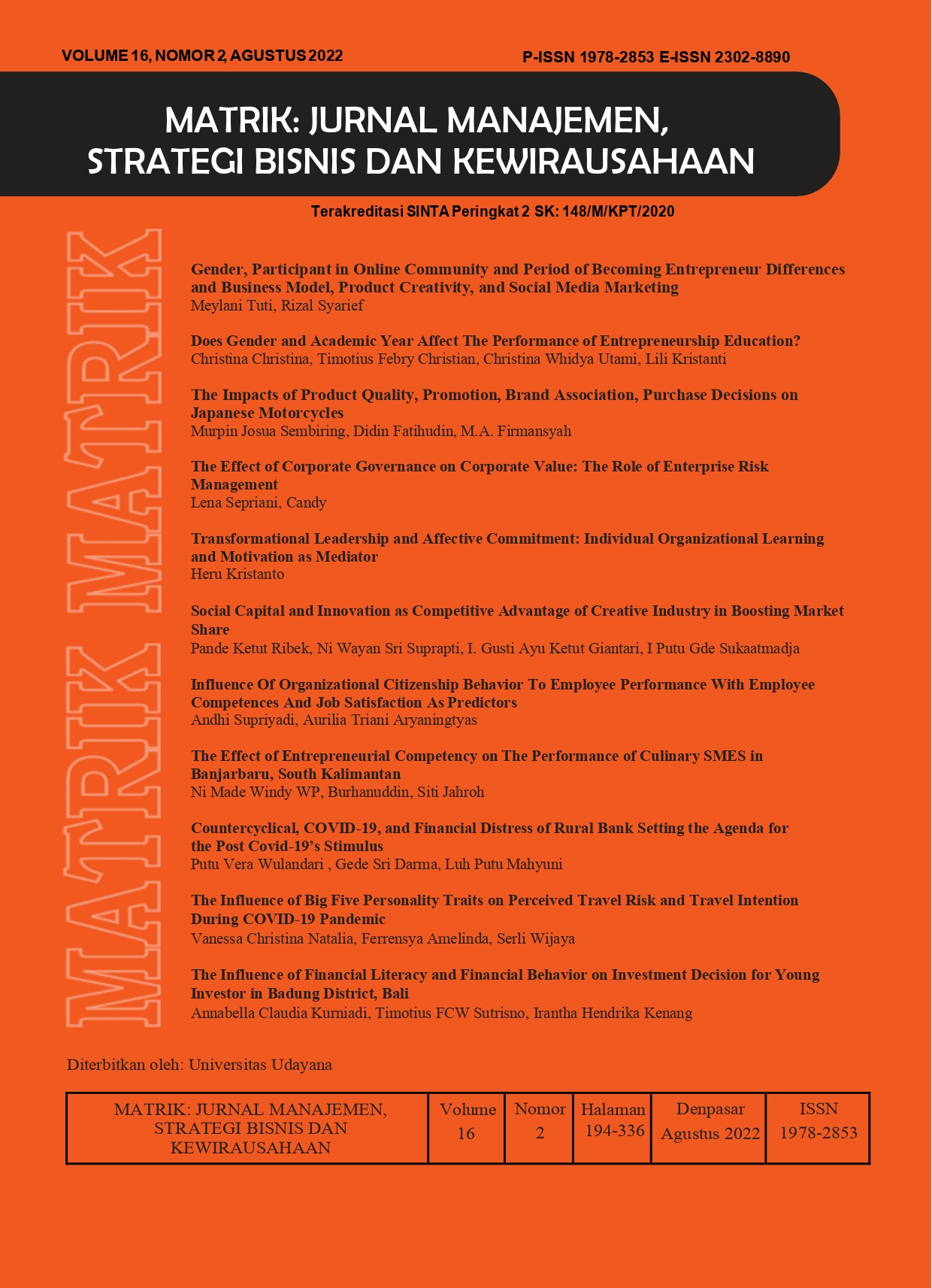The Influence of Big Five Personality Traits on Perceived Travel Risk and Travel Intention During COVID-19 Pandemic
Abstract
Penelitian ini bertujuan untuk mengetahui pengaruh ciri kepribadian terhadap persepsi risiko berwisata dan minat berwisata wisatawan Indonesia di masa pandemi Covid-19. Ciri kepribadian wisatawan digali dari perspektif teori Big Five Personality Traits. Survei secara daring disebarkan kepada 202 responden yang mengisi kuisioner lewat Google form. Penelitian ini menggunakan SEM-PLS untuk pengolahan data primer. Hasil penelitian menunjukkan bahwa dari lima ciri kepribadian, hanya ciri kepribadian conscientiousness yang berpengaruh signifikan terhadap persepsi risiko berwisata. Persepsi risiko berwisata berpengaruh negatif dan signifikan terhadap minat berwisata. Selanjutnya, persepsi risiko berwisata terbukti merupakan mediator yang signifikan dari ciri kepribadian conscientiousness dan pengaruhnya terhadap minat wisatawan untuk berwisata.
ABSTRACT
This study aims to determine the effect of personality traits on travel perceived risk and travel intention of Indonesian tourists during the Covid-19 pandemic era. The online survey was distributed to 202 respondents who filled out the questionnaire via Google forms. This study uses SEM-PLS for primary data processing. The results showed that of big five personality traits, only conscientiousness trait had a significant effect on perceived travel risk. Tourists’ travel perceived risk had a negative and significant effect on travel interest. Further, tourists’ travel perceived risk was a significant mediator of the conscientiousness personality trait and its influence on travel intention.
Downloads
References
Agyeiwaah, E., Adam, I., Dayour, F., & Badu Baiden, F. (2021). Perceived impacts of Covid-19 on risk perceptions, emotions, and travel intentions: Evidence from macau higher educational institutions. Tourism Recreation Research, 46(2), 195-211. doi:10.1080/02508281.2021.1872263
Aren, S., & Hamamci, H. N. (2020, October). Relationship between risk aversion, risky investment intention, investment choices. Kybernetes, 49(11), 2651-2682. doi:10.1108/k-07-2019-0455
Artuger, S. (2015). The effect of risk perceptions on tourists’ revisit intentions. European Journal of Business and Management, 7(2), 36-44
Badan Pusat Statistik. “Perilaku Masyarakat Pada Masa PPKM Darurat, Hasil Survei Perilaku Masyarakat pada Masa Pandemi Covid-19”, Periode 13-20 Juli 2021. (2021, August 2). Retrieved August 20, 2021, from Badan Pusat Statistik, 2022, https://www.bps.go.id/publication/2021/08/02/29234b08faa4910dee5279af/perilaku-masyarakat-pada-masa-ppkm-darurat--hasil-survei-perilaku-masyarakat--pada-masa-pandemi-Covid-19--periode-13-20-juli-2021.html
Chew, T. Y. E, & Jahari, A. S. (2014). Destination image as a mediator between perceived risks and revisit intention: A case of post-disaster Japan. Tourism Management, 40, 382-393. http://dx.doi.org/10.1016/j.tourman.2013.07.008
Donnellan, M. B., Oswald, F. L., Baird, B. M., & Lucas, R. E. (2006, July). The mini-ipip scales: Tiny-yet-effective measures of the big five factors of personality. Psychological Assessment, 18(2), 192-203. doi:10.1037/1040-3590.18.2.192
Egger, R., & Neuburger, L. (2020, August). Travel risk perception and travel behaviour during the Covid-19 pandemic 2020: A case study of the DACH region. Current Issues in Tourism, 24(7), 1003-1016. doi:10.1080/13683500.2020.1803807
Fajria, H. (2020, October). Indonesian youth don’t care about Covid-19? Research explains why. https://www.feb.ui.ac.id/en/blog/2020/10/12/indonesian-youth-dont-care-about-Covid-19-heres-the-research/
Fyhri, A., & Backer-Grøndahl, A. (2012, November). Personality and risk perception in transport. Accident Analysis & Prevention, 49, 470-475. doi:10.1016/j.aap.2012.03.017
George, R. (2010). Visitor perceptions of crime-safety and attitudes towards risk: the case of table mountain national park, cape town. Tourism Management, 31(6), 806-815. https://doi.org/10.1016/j.tourman.2009.08.011
Goldberg, L. R. (1992). The development of markers for the Big-Five factor structure. Psychological assessment, 4(1), 26.
Gordon, S. “Understanding agreeableness and its impact on your behavior”. Verywell Mind, https://www.verywellmind.com/how-agreeableness-affects-your-behavior-4843762
Gössling, S., Scott, D., & Hall, C. M. (2020). Pandemics, tourism and global change: a rapid assessment of COVID-19. Journal of Sustainable Tourism, 29(1), 1-20.
Hahn, T., Figge F., Pinkse, J. et al. (2018). A paradox perspective on corporate sustainability: Descriptive, instrumental, and normative aspects. Journal of Business Ethics, 148, 235-248. https://doi.org/10.1007/s10551-017-3587-2
Hair, J. F., M., H. G., Ringle, C. M., & Sarstedt, M. (2017). A primer on partial least squares structural equation modeling (pls-sem) (2nd ed.). Sage Publications.
Hashim, N. A., Noor, M. A., Awang, Z., & Aziz, R. C. (2018, December 29). The Influence of Tourist Perceived Risk towards Travel Intention: A Conceptual Paper. International Journal of Academic Research in Business and Social Sciences, 8(16), 92-102. doi:10.6007/IJARBSS/v8-i16/5120
Hermawan, H., & Hendrastomo, G. (2017). Traveling Sebagai Gaya Hidup Mahasiswa Yogyakarta. Jurnal Sosiologi UNY Vol 6, No 2
Kementerian Pariwisata dan Ekonomi Kreatif - Sertifikasi CHSE. (2021). CHSE ~ kementerian Pariwisata Dan Ekonomi Kreatif - Sertifikasi Chse. Retrieved October 06, 2021, from https://chse.kemenparekraf.go.id/
Kovačić, S., Mărgărint, M. C., Ionce, R., & Miljković, Đ. (2020, August). What are the factors affecting tourist behavior based on the perception of risk? Romanian and Serbian tourists’ perspective in the aftermath of the recent floods and wildfires in Greece. Sustainability, 12(16), 6310. doi:10.3390/su12166310
Kővári, I.., & Zimányi, K. (2011). Safety and security in the age of global tourism. Applied Studies in Agribusiness and Commerce, 5(3-4), 59–61. https://doi.org/10.19041/APSTRACT/2011/3-4/10
Leung, R., & Law, R. (2010). A review of personality research in the tourism and hospitality context. Journal of Travel & Tourism Marketing, 27(5), 439-459. http://dx.doi.org/10.1080/10548408.2010.499058
Lim, A. (2020, June 15). The big five personality traits. Simply Psychology, https://www.simplypsychology.org/big-five-personality.html. Accessed 21 August 2021.
Maritz, A., Shieh, C., & Yeh, S. (2013). Effects of personality trait on perceived risk and travel intention in tourism industry. Actual Problems of Economics, 2(3).
Martin, C. C. (2020, May). Hexaco traits, big five traits, and Covid-19. https://doi.org/10.31234/osf.io/c9gxe
R. (2021, June 22). Pemerintah Gencarkan Upaya penanganan Lonjakan Kasus Covid-19. Retrieved August 20, 2021, from https://sehatnegeriku.kemkes.go.id/baca/beritautama/20210622/1337942/pemerintah-gencarkan-upaya-penanganan-lonjakan-kasusCovid-19/
Reisinger, Y., & Mavondo, F. (2005). Travel anxiety and intentions to travel internationally: Implications of travel risk perception. Journal of travel research, 43(3), 212-225.
Shook, N. J., Sevi, B., Lee, J., Oosterhoff, B., & Fitzgerald, H. N. (2020). Disease avoidance in the time of Covid-19: The behavioral immune system is associated with concern and preventative health behaviors. PLoS ONE 15:e0238015. doi: 10.1371/journal.pone.0238015
Tepavčević, J., Blešić, I., Petrović, M. D., Vukosav, S., Bradić, M., Garača, V., Lukić, D. (2021, November). Personality traits that affect travel intentions during pandemic Covid-19: The case study of serbia. Sustainability, 13(22), 12845. doi:10.3390/su132212845
UNWTO. (2020). 2020: A year in review. https://www.unwto.org/Covid-19-and-tourism-2020
 This work is licensed under a Creative Commons Attribution-ShareAlike 4.0 International License.
This work is licensed under a Creative Commons Attribution-ShareAlike 4.0 International License.

















